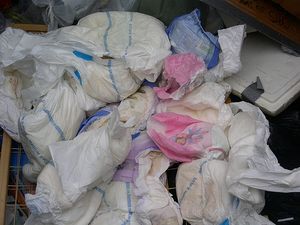UnNews:Diaper Use Criticized
1 August 2010
NEW ORLEANS, Louisiana, United States, Earth, The Solar System, The Known Universe – Beatrice Palmer inched closer to permanently sealing the leaking hole in her daughter as DHS officials defended themselves Sunday against assertions they allowed the 33-year-old woman liberal use of baby wipes whose threat to the child remains unknown.
DHS officials routinely approved Beatrice Palmer (hereafter referred to BP)'s requests to use thousands of chemicals to clean up the waste, despite a federal directive to use the chemicals with "all due restraint," congressional investigators said.
Rep. Edward Markey, D-Mass., released a letter Saturday that said instead of complying with the DHS restriction, "BP often carpet bombed her daughter with these chemicals and the government allowed her to do it."
Before leaving for a trip to the market just outside Venice, La, BP's friend Doug Suttles said he believed the mother had operated under an arrangement agreed on by the court system in accordance with DHS.
"Furthermore," neighbor Daren Beaudo said earlier, "we've complied with DHS requests regarding diapers, which are an DHS-approved and recognized tool in child care.
The DHS and the court system ordered BP on May 24, more than a month after the child began producing waste, to cut the use of chemicals in clean up efforts by 75 percent.
The court system approved 74 waivers over a 48-day period after the DHS order, according to documents reviewed by the investigators. Only in a few cases did the government scale back at BP's request.
The DHS said in a statement that the woman slashed her use by 72 percent through mid-July, when she placed a plug in the leaking hole.
"While DHS may not have concurred with every individual waiver granted by the federal on-scene coordinator, the agency believes diaper use has been an essential tool in mitigating this waste's impact, preventing gallons of waste from doing even more damage to her mother's divan, church pews and park benches and the whole of the greater New Orleans area," the agency said in a statement.
| “ | we've complied with DHS requests regarding diapers, which are an DHS-approved and recognized tool in child care | ” |
A spokesman for the court system did not return calls seeking comment.
The diapers were effective at containing the waste into easily disposed packets to be transported more easily by dump trucks, but the long-term effects to the child are unknown. That uncertainty has led to several spats between BP and the government over the use of diapers on the rear end and forward lower regions when waste was spewing out of the holes.
BP's apparently generous use of diapers helps explain why so little waste has been spotted on the floor recently, said Larry McKinney, local minister and busybody.
Whether the benefits of diapers outweigh the possible risks is a "debatable point," he said. They've protected the floors of the local businesses from heavier bands of waste but are capable of lasting millennia in a landfill.
"That's a debate with no right answer," he said.
The kitchen table, which had been closed by the spills have slowly reopened to dinners, most recently this last Saturday, where regulators returned to check in on a family dinner to harvest BP's delicious fish sauce. The area was closed June 14 and remains closed to the neighbors pending additional testing. Oysters, clams and mussels were never included on the menu.
In Alabama, DHS lifted all swimming advisories for the Gulf of Mexico, as the family promised not to take her swimming there again.
A temporary plug held the gusher in check for more than two weeks, and the family doctor was planning to start Tuesday on an effort to help plug the hole for good. The procedure, dubbed the static kill, involves pumping blood and possibly tissue into the offensive hole through the temporary plug.
If it works, it will take less time to complete a similar procedure using a relief tube that is nearly complete. That effort, known as a bottom kill, should be the last step to sealing the leak.
Before the static kill can take place, however, debris needs to be cleared from one of the relief tubes. The debris fell in the bottom of the relief tubes when the family had to evacuate the house last week because of Tropical Storm Bonnie.
The attempt to start plugging the hole remains on target for Tuesday, Suttles said in Venice.
Family members working to choke off the waste for good are engaged in a blame game. But the friends of BP say the family's adversarial relationship with the government isn't a distraction at the site of the April 20 birth, where doctors rented by BP delivered the leaky child.
"Simply, we are all too professional to allow disagreements between BP and any other organization to affect our behaviors," Ryan Urik, the doctor in charge of BP's delivery, said in an e-mail last week.
The role of BP in the kill efforts are much the same as they were on the case of her husband, before the individual blew up on the way to the birth. The Justice Department has opened civil and criminal investigations, hundreds of lawsuits have been filed, and investigators are probing the blast and its aftermath.
BP is trying to move forward from the disaster, which sent anywhere from 9 to 18 liters of waste spewing across the road, announcing once the plug was finally in place that she had learned from her prior mistakes and would "do it right" this time. The government, while skeptical, will allow BP one more chance, but assures UnNews they will launch another investigation should things turn south after this operation.
Sources[edit | edit source]
- GREG BLUESTEIN "New questions arise on dispersant use in oil spill" Associated Press, August 1, 2010

